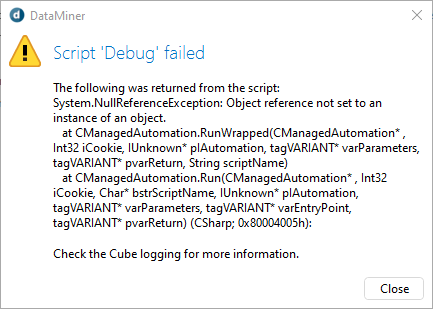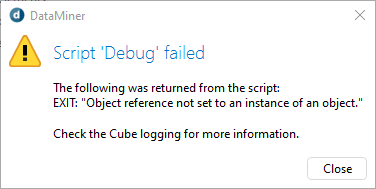Making your automation scripts debug-ready
While you are working on automation scripts, exceptions can be thrown because of all kinds of valid reasons: executing actions on a variable that is not initialized, methods that are not yet fully implemented, etc.
By default, automation scripts do not show the stack trace you may expect when an exception occurs. To help you save precious time when debugging, below we will explain how you can make sure that exceptions are handled correctly from the very start.
Example of default behavior
The following code will result in an exception being thrown:
/// <summary>
/// DataMiner Script Class.
/// </summary>
class Script
{
/// <summary>
/// The Script entry point.
/// </summary>
/// <param name="engine">Link with SLAutomation process.</param>
public void Run(Engine engine)
{
CustomClass myCustomClass = InitCustomClass();
LogStringValue(engine, myCustomClass);
}
private void LogStringValue(Engine engine, CustomClass customClass)
{
engine.GenerateInformation(customClass.StringValue);
}
private CustomClass InitCustomClass()
{
return null;
}
}
public class CustomClass
{
public string StringValue { get; set; }
public double DoubleValue { get; set; }
}
Because of the exception, the following pop-up window will be shown:

In the Automation log file, you will find the following entries:
2021/09/21 15:11:16.877|SLAutomation.exe 10.1.2132.1478|16988|9368|CSharp|DBG|-1|(Script Debug/1) System.NullReferenceException: Object reference not set to an instance of an object.
at CManagedAutomation.RunWrapped(CManagedAutomation* , Int32 iCookie, IUnknown* pIAutomation, tagVARIANT* varParameters, tagVARIANT* pvarReturn, String scriptName)
at CManagedAutomation.Run(CManagedAutomation* , Int32 iCookie, Char* bstrScriptName, IUnknown* pIAutomation, tagVARIANT* varParameters, tagVARIANT* varEntryPoint, tagVARIANT* pvarReturn) (CSharp; 0x80004005h):
This only shows that the Run and RunWrapped methods are executed, which is internal DataMiner logic.
Making exceptions meaningful
You can make the exception more meaningful by adding a try-catch as shown below.
public void Run(Engine engine)
{
try
{
RunSafe(engine);
}
catch (Exception ex)
{
engine.Log(ex.ToString());
engine.ExitFail(ex.Message);
}
}
private void RunSafe(Engine engine)
{
CustomClass myCustomClass = InitCustomClass();
LogStringValue(engine, myCustomClass);
}
The pop-up window will just show what went wrong:

However, the logging will contain the full stack trace that you need for debugging:
2021/09/21 15:23:52.915|SLAutomation.exe 10.1.2132.1478|16988|6768|Script|INF|-1|[Jens Vandewalle] (Script Debug) Log Message: "System.NullReferenceException: Object reference not set to an instance of an object.
at Script.LogStringValue(Engine engine, CustomClass customClass)
at Script.RunSafe(Engine engine)
at Script.Run(Engine engine)"